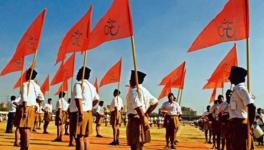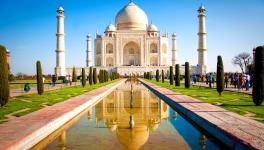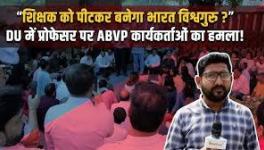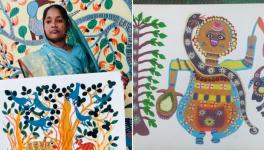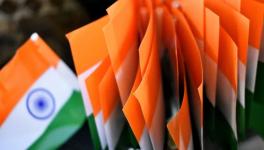Excluding the People
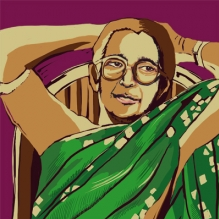
Image Courtesy: Indian Cultural Forum
The masks came off soon after condoling writer Mahasweta Devi’s death. Unmasked, the right-wing pseudo-nationalists were on the prowl for their daily target. They found it in a play staged in the University of Haryana; the play was based on Mahasweta’s story, Draupadi. The ABVP attack was to convince us that a story, a story that exposes violence against a woman activist, a story by a writer you have just praised, can turn anti-national.
Is this hypocrisy? Ignorance? Habitual hate-mongering? Or all this and something more, a choice between culture that includes people and culture that excludes people? The other day, inaugurating a conference organised by the Indian People’s Theatre Association (IPTA) in Indore, filmmaker M.S. Sathyu criticised the shrill calls to keep Pakistani artistes out of India. What has now become the standard of “debate” followed: The IPTA conference was disrupted. This attack, by the right-wing Bharat Swabhiman Manch, was to convince us that IPTA is anti-national. Either the Manch “nationalists” don’t know of IPTA’s role in the independence movement, or its attempts to strengthen people’s culture; or of the conspicuous absence of the RSS in the freedom struggle. Or the pseudo-nationalists want militarised culture, so that the practice of people’s culture — inclusive, with no borders within India or across the world — becomes “anti-national”.
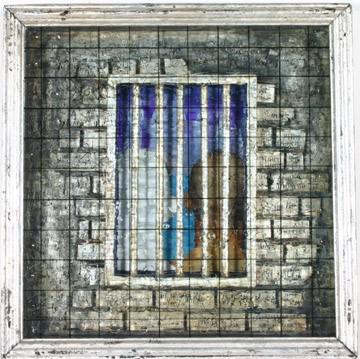
Image courtesy: Indian Cultural Forum/ Via SAHMAT
Consider the project of shrinking culture by drawing borders within India. There’s a fear lurking in the strident accusation of “anti-national” that so much of our cultural work, and so many of our cultural events, is now charged with. It’s the fear of what happened last year. The powerful chorus of voices raised by writers, artists, performers, academics and scientists across caste, gender, community, language and region, insisted that Indian culture is a living system of multiple voices, multiple narratives and counter-narratives.
It’s the fear of what continues to happen: The re-energised Dalit movements, the revulsion caused by atrocities against tribals, the murder of rationalists and Muslims such as Akhlaq, the suppressing of youth in campuses, and, of course, the insistence that educational and cultural institutions are spaces for discussion and debate. The pseudo-nationalist opponents of culture are afraid of the insistence on democratic rights, freedom of speech, dissent, reason, a scientific temper. They are afraid of all those who speak for an inclusive culture, rather than a militarised culture that excludes more and more people.
A militarised culture finds new ways to exclude people every day; whether it is actor Nawazuddin Siddiqui kept out of the Ramlila or Muslims out of garba events, or whether it is asking Urdu writers to sign an undertaking that they will not write anything “anti-national”. This is the context for the call to ban actors with Pakistani citizenship in Indian cultural projects. The target here is not Pakistani “artistes”. It’s our own citizens, whether writers, filmmakers or artists, and their commitment to practising culture that does not follow an officially sanctioned script. With all the jingoism in the air (and on air), the time is ripe to extend militarising the nation to militarising cultural practice. The right-wing dreams of India in uniform, preferably khaki.
If we let this happen, there will be no Indian culture left. Indeed, we will lose any kind of culture, because cultural practice does not recognise borders within or outside India. We can condemn the terror, or the wars states and state-backed groups inflict on people, ours and theirs, wounding people, jawans and civilians, killing them, taking them away from the real business of life. But do we condemn people? Men, women and children who have nothing to do with the power games states play, people who are not hate-mongers, who only want peace so they can farm their fields, earn for their families, study, pray, and make their music and film and poetry?
People’s culture shows us the way out of the jingoist, militarised nightmare of borders within India, and borders between Indians and other nationalities. People have practised their own borderless culture in the past, during times more tumultuous than ours. Only a decade after Partition, there was an example of collaboration between Indian and Pakistani artists; the kind of inclusion that can and must happen in people’s culture. A 1958 Urdu film, Jago Hua Savera, was not about rulers, borders or patriotism. It was about the hard lives of common people — the fishing community in a village near Dhaka, suffering in the clutch of moneylenders. The script, lyrics and dialogue was by Faiz Ahmad Faiz. Faiz’s script was inspired by a Bengali story by Manik Bandopadhyay. The music was by Timir Baran of Calcutta.
Closer in time, in 1997, six of us Indian writers were invited to talk to six Pakistani writers on the fiftieth anniversary of independence. The grand old man of letters, Intizar Husain, spoke for the cultural community on both sides of the border. He said, “So much that is important to me as a writer is on the other side of the border. The Jataka Tales, Meerabai’s bhajans, the Delhi I knew. How do I remain a writer if I pretend all these are no longer mine?”
So what kind of culture should we strengthen? History has examples of the choice we have, both as a nation and as people. In 1935, one of the best known propaganda films was made. Leni Riefenstahl’s film Triumph of the Will was commissioned by Hitler. The theme Hitler had in mind was Germany’s glory under his leadership. But even as the film glorifies the official narrative of the Nazis, we can see how the nation’s “glory” involves excluding people, whether Jewish, Communist, or Germans with a more inclusive, humane view of the world. In stark contrast, Mahmoud Darwish, often referred to as the Palestinian national poet, wrote the Palestinian declaration of independence in 1988 and many poems of resistance that are an integral part of every Arab’s consciousness. But he also wrote, just after the 1967 war, a tender poem about an Israeli soldier, A Soldier Who Dreams of White Lilies. Darwish responded to criticism with what could be the motto of every practitioner of an inclusive people’s culture: He would, he said, “continue to humanise even the enemy”.
Who do we want to emulate, we who own culture, we who make culture to express our strongest hopes, dreams and fears? Riefenstahl or Darwish? ABVP or Mahasweta Devi? Bharat Swabhiman Manch or IPTA? Only a culture in touch with people’s lives, open to dissenting voices, this side of the border or that, can keep culture, its myriad voices, from being reduced to a single dangerous voice.
Disclaimer: The views expressed here are the author's personal views, and do not necessarily represent the views of Newsclick
Get the latest reports & analysis with people's perspective on Protests, movements & deep analytical videos, discussions of the current affairs in your Telegram app. Subscribe to NewsClick's Telegram channel & get Real-Time updates on stories, as they get published on our website.













